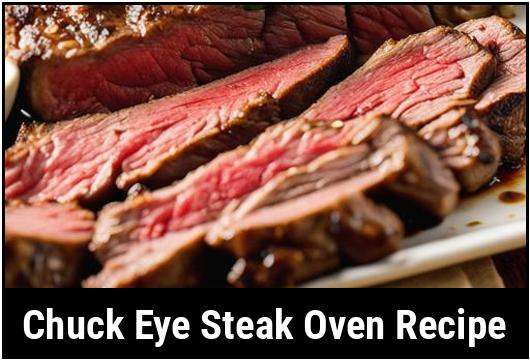
Chuck Eye Steak Oven Recipe: Mastering A Juicy And Flavorful Delight
Introduction:
Welcome to the ultimate guide on cooking chuck eye steak in the oven! In this comprehensive article, we will dive into the marvelous world of chuck eye steak, exploring its origin, culinary details, the selection and cleaning process, as well as various preparation methods, tips for achieving the perfect doneness, and a mouthwatering recipe that is sure to impress your taste buds. Let’s get started!
Understanding Chuck Eye Steak:
Chuck eye steak, often referred to as "the poor man’s ribeye," is a popular beef cut that comes from the shoulder area of the cow. It is renowned for its rich flavor, tenderness, and beautiful marbling, making it a top choice for steak lovers. While not as widely recognized as ribeye or filet mignon, the chuck eye steak offers exquisite taste at a more wallet-friendly price point.
Selecting the Perfect Chuck Eye Steak:
Choosing high-quality chuck eye steak is crucial to achieving a remarkable culinary experience. When selecting your steak, keep the following pointers in mind:
-
Look for marbling: Marbling refers to the thin streaks of fat running through the meat. Seek out steaks with generous marbling, as this greatly enhances tenderness and flavor.
-
Color: Opt for steaks with a vibrant reddish color, indicating freshness and proper aging.
-
Thickness: While personal preference may vary, aim for steaks that are around 1 to 1.5 inches thick to ensure even cooking.
-
Avoid excessive moisture: Examine the steak and avoid any excessively wet or slimy surfaces, as this can be an indication of poor quality.
-
Preferably boneless: While chuck eye steaks are typically sold boneless, double-check to ensure you are purchasing the boneless variant. Bone-in steaks require a different cooking technique.
Cleaning and Preparation:
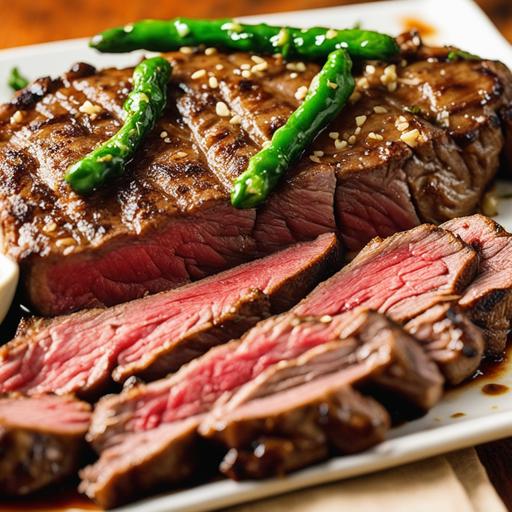
Now that you have sourced the perfect chuck eye steak, it’s time to prepare it for cooking:
-
Handling and temperature: Always handle raw meat with clean hands and ensure your work surfaces and utensils are properly sanitized. Let the steak rest at room temperature for 30 minutes prior to cooking. This allows for more even cooking throughout the meat.
-
Trimming excess fat: While chuck eye steak already has a nice fat content, it is advisable to trim any excessive and loose fat from the edges. Leave a thin layer intact to enhance juiciness during cooking.
-
Seasoning: To maximize the flavor profile, generously season the steak with coarse salt, freshly ground black pepper, and any desired herbs or spices. Pat the seasoning gently onto both sides of the steak, allowing it to adhere properly.
Tips for Achieving the Perfect Doneness:
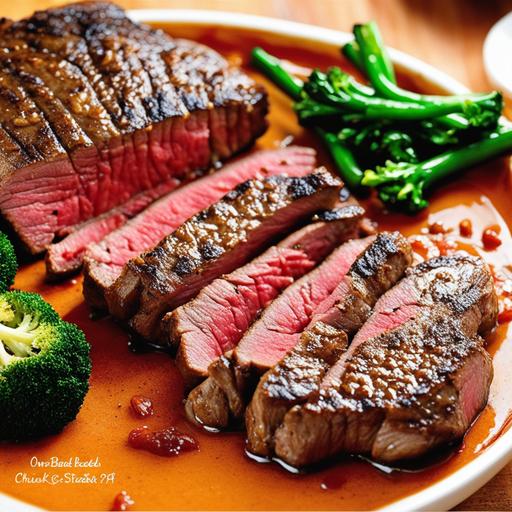
Determining the level of doneness is subjective and varies from person to person. Utilize the following guidelines to gauge your preferred level of doneness:
-
Rare: Bring the internal temperature to about 125°F (51.7°C). This results in a cool, red center that is soft and tender.
-
Medium Rare: Aim for an internal temperature of approximately 135°F (57.2°C). This level delivers a warm, red center, providing a perfect balance between tenderness and flavor.
-
Medium: Achieve an internal temperature of around 145°F (62.8°C) for a warm pink center. The steak will still be tender but slightly firmer than medium rare.
-
Medium Well: For a slightly pink, firm center, attain an internal temperature of about 155°F (68.3°C).
-
Well Done: Cook until the internal temperature reaches 160°F (71.1°C). At this point, the steak will be fully cooked throughout, with no pinkness remaining.
The Chuck Eye Steak Oven Recipe:
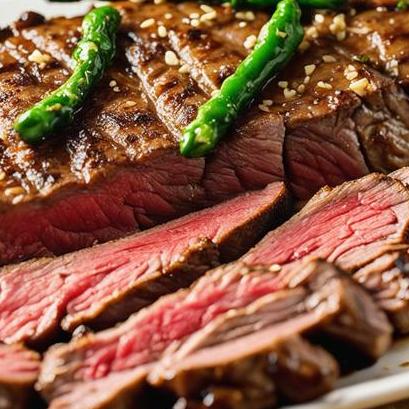
Ingredients:
-
2 chuck eye steaks (1 to 1.5 inches thick)
-
Coarse salt and freshly ground black pepper
-
2 tablespoons of olive oil
-
Optional seasoning (e.g., garlic powder, paprika, dried herbs)
Instructions:
-
Preheat your oven to 425°F (218°C).
-
Season the chuck eye steaks generously with coarse salt, freshly ground black pepper, and any additional desired seasonings. Ensure both sides are thoroughly coated.
-
Heat a skillet over medium-high heat with 2 tablespoons of olive oil. Once the oil is hot, place the seasoned steaks into the skillet and sear each side for 2 minutes, until a golden brown crust forms.
-
Transfer the skillet, including the steaks, to the preheated oven. Allow the steaks to cook for approximately 7-10 minutes, depending on desired doneness. Utilize a meat thermometer to check the internal temperature periodically.
-
Once the desired internal temperature is reached, remove the steaks from the oven and transfer them to a cutting board.
-
Let the chuck eye steaks rest for 5 minutes to seal in the juices. This will enhance their tenderness and flavor.
-
Finally, slice the steaks against the grain to ensure maximum tenderness and serve immediately. Pair with your favorite sides or sauces for a complete meal.
Overcooking and Undercooking:
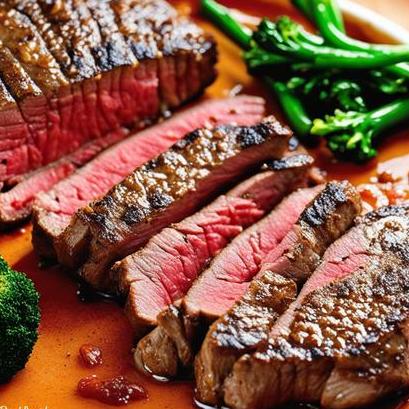
Cooking a chuck eye steak to perfection requires precision, but everyone can encounter overcooking or undercooking at some point. Here are some common issues and solutions:
-
Overcooking: If you accidentally overcook the steak resulting in dryness, consider making a rich sauce or using a marinade to add moisture and flavor. Remember, practice makes perfect, and you’ll become more skilled at achieving your desired level of doneness with experience.
-
Undercooking: If the steak is undercooked, you can always return it to the oven at a lower temperature for a few more minutes until the desired doneness is achieved. Make sure to monitor the internal temperature closely to avoid overcooking.
Variations and Enhancements:
Looking to add a personal touch or explore different flavors? Here are some variations and enhancements you can experiment with:
-
Herb Butter: Create a delightful herb butter by mixing softened butter with fresh herbs like rosemary, thyme, or parsley. Once your steak is cooked, place a pat of herb butter on top, allowing it to melt and infuse for an extra burst of flavor.
-
Marinades: Enhance the chuck eye steak’s taste and tenderness by marinating it prior to cooking. Options for marinades are vast, ranging from teriyaki and garlic to red wine or balsamic vinegar-based mixtures. Remember to refrigerate the steak while marinating.
-
Sous Vide: For a perfectly cooked chuck eye steak, consider using the sous vide method. This involves vacuum-sealing the seasoned steak and immersing it in a precisely controlled water bath until your desired level of doneness is achieved. Finish off by searing the steak to create a flavorful crust.
Conclusion:
Congratulations! You now possess a comprehensive understanding of cooking chuck eye steak in the oven. From selecting the perfect cut to mastering the right cooking technique, you are well-equipped to dazzle your family and friends with a succulent and flavorful dining experience. Remember, cooking is both an art and a science, so don’t hesitate to experiment and create your unique variations. Enjoy your culinary adventure and savor the delightful flavors of chuck eye steak! Bon appétit!
Sources
FAQS On Chuck Eye Steak Oven Recipe
What Is A Chuck Eye Steak?
A chuck eye steak comes from the shoulder area of the cow and is a flavorful and juicy cut of meat that is similar to a ribeye steak.
How Do I Prepare A Chuck Eye Steak In The Oven?
To make a delicious chuck eye steak in the oven, start by seasoning the steak with salt, pepper, and any other desired seasonings. Next, heat a cast-iron skillet on high heat and sear the steak for 3-4 minutes on each side until it develops a nice crust. Then, transfer the skillet to a preheated 375-degree F oven and cook the steak for an additional 5-7 minutes or until it reaches your desired level of doneness. Let the steak rest for a few minutes before slicing and serving.
What Are Some Good Side Dishes To Serve With A Chuck Eye Steak?
Some popular side dishes to serve with a chuck eye steak include roasted vegetables, mashed potatoes, roasted potatoes, garlic bread, or a simple green salad.
How Should I Store Any Leftover Chuck Eye Steak?
To store leftover chuck eye steak, wrap it tightly in plastic wrap or aluminum foil and store it in the refrigerator for up to 3-4 days. If you plan on storing it for longer, consider freezing it instead for up to 3-4 months.
Can I Cook A Chuck Eye Steak On A Gas Grill Instead Of In The Oven?
Absolutely! To grill a chuck eye steak, prepare it the same way as you would for the oven, then preheat your gas grill to high heat. Grill the steak for 3-4 minutes on each side until it develops a nice crust, then move it to a cooler part of the grill and cook it for an additional 5-7 minutes or until it reaches your desired level of doneness. Let the steak rest for a few minutes before serving.


